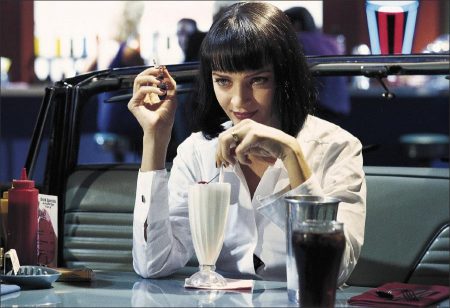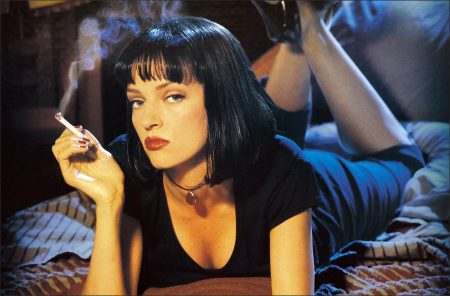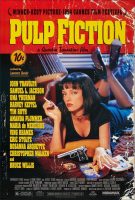Tagline: Girls like me don’t make invitations like this to just anyone!
Pulp Fiction movie storyline. Vincent Vega (John Travolta) and Jules Winnfield (Samuel L. Jackson) are two hit men on the hunt for a briefcase whose contents were stolen from their boss, Marsellus Wallace (Ving Rhames). They run into a few unexpected detours along the road. Marsellus is out of town, and he’s gotten Vincent to take care of his wife, Mia (Uma Thurman. That is, take her out for a night on the town. Things go smoothly until one of them makes a huge error.
Butch Coolidge (Bruce Willis) is a boxer who’s been approached by Marsellus and been told to throw his latest fight. When Butch ends up killing the other boxer, he must escape Marsellus. Pumpkin (Tim Roth) and Honey Bunny (Amanda Plummer) (not their real names) are two lovebirds/thieves who have decided to rob the restaurant they’re currently eating at. But the restaurant doesn’t turn out to be as easy as the other places they’ve robbed.
Pulp Fiction (1994) is an American crime film directed by Quentin Tarantino, who cowrote its screenplay with Roger Avary. The film is known for its rich, eclectic dialogue, ironic mix of humor and violence, nonlinear storyline, and host of cinematic allusions and pop culture references. The film was nominated for seven Oscars, including Best Picture; Tarantino and Avary won for Best Original Screenplay. It was also awarded the Palme d’Or at the 1994 Cannes Film Festival. A major critical and commercial success, it revitalized the career of its leading man, John Travolta, who received an Academy Award nomination, as did costars Samuel L. Jackson and Uma Thurman.
Directed in a highly stylized manner, Pulp Fiction joins the intersecting storylines of Los Angeles mobsters, fringe players, small-time criminals, and a mysterious briefcase. Considerable screen time is devoted to conversations and monologues that reveal the characters’ senses of humor and perspectives on life. The film’s title refers to the pulp magazines and hardboiled crime novels popular during the mid-20th century, known for their graphic violence and punchy dialogue. Pulp Fiction is self-referential from its opening moments, beginning with a title card that gives two dictionary definitions of “pulp”. The plot, in keeping with most of Tarantino’s other works, is presented out of chronological sequence.

The picture’s self-reflexivity, unconventional structure, and extensive use of homage and pastiche have led critics to describe it as a prime example of postmodern film. Considered by some critics a black comedy, the film is also frequently labeled a “neo-noir”. Critic Geoffrey O’Brien argues otherwise: “The old-time noir passions, the brooding melancholy and operatic death scenes, would be altogether out of place in the crisp and brightly lit wonderland that Tarantino conjures up. [It is] neither neo-noir nor a parody of noir”.
Similarly, Nicholas Christopher calls it “more gangland camp than neo-noir”, and Foster Hirsch suggests that its “trippy fantasy landscape” characterizes it more definitively than any genre label. Pulp Fiction is viewed as the inspiration for many later movies that adopted various elements of its style. The nature of its development, marketing, and distribution and its consequent profitability had a sweeping effect on the field of independent cinema (although it is not an independent film itself). A cultural watershed, Pulp Fiction’s influence has been felt in several other media.
Pulp Fiction (1994)
Directed by: Quentin Tarantino
Starring: John Travolta, Samuel L. Jackson, Uma Thurman, Harvey Keitel, Tim Roth, Amanda Plummer, Maria de Medeiros, Ving Rhames, Eric Stoltz, Rosanna Arquette, Christopher Walken, Bruce Willis
Screenplay by: Quentin Tarantino
Production Design by: David Wasco
Cinematography by: Andrzej Sekula
Film Editing by: Sally Menke
Costume Design by: Betsy Heimann
Set Decoration by: Sandy Reynolds-Wasco
Art Direction by: Charles Collum
MPAA Rating: R for strong graphic violence and drug use, pervasive strong language and some sexuality.
Distributed by: Miramax Films
Release Date: May 12, 1994 (Cannes), October 14, 1994 (United States)
Views: 1166


